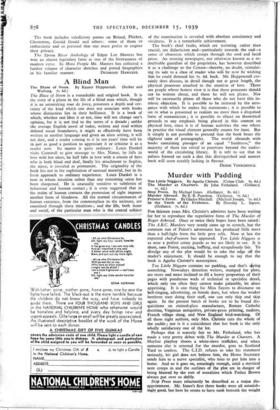A Blind Man
The Blaze of Noon is a remarkable and original book. It is the story of a phase in the life of a blind man which, though it is an astonishing tour de force, possesses a depth and cer- tainty of the kind which one does not associate with books whose distinction lies in their brilliance. It is a book of which, whether one likes it or not, time will not change one's opinion, for it is not tied to the tastes of a decade ; unlike the average English novel of today, written and read within defined social boundaries, it might as effectively have been written in another language and given an alien setting, it will not date, and a reader coming to it in ten years' time will be in just as good a position to appreciate it or criticise it as a reader now. Its matter is quite ordinary : Louis Dunkel visits Cornwall to give massage to Mrs. Nance, he falls in love with her niece, he half falls in love with a cousin of hers who is both blind and deaf, finally his attachment to Sophie, the niece, is revealed as permanent. The originality of the book lies not in the exploitation of unusual material, but in its fresh approach to ordinary experience. Louis Dunkel is a man in whom intuition rather than any remaining sense has been sharpened. He is unusually sensitive to subtleties of behaviour and human contact ; it is even suggested that in the realm of human contacts the possession of sight imposes another form of blindness. All the normal circumstances of human existence, from the commonplace to the intimate, are examined through these intuitions ; and the life, both inner and social, of the particular man who is the central subject
of the examination is revealed with absolute consistency and vividness. It is a remarkable achievement.
The book's chief faults, which are irritating rather than crucial, are didacticism and—particularly towards the end—a sense of obsession which creeps through the cool and lucid prose. An evening newspaper, not otherwise known as a re- doubtable guardian of the proprieties, has however described it as a challenge to the Censor—thereby, no doubt, stimulat- ing its sale to a class of reader who will by now be wishing that he could demand his 7s. 6d. back. Mr. Heppenstall cer- tainly does discuss, in detail though not at great length, the physical processes attached to the emotion of love. There are people whose honest view it is that these processes should not be written about, and these he will not please. Nor will he necessarily please all those who do not have this in- trinsic objection. It is possible to be irritated by the arro- gance with which he makes his statements ; it is possible to see in what is presented as realism no more than a disguised form of romanticism ; it is possible to object on theoretical grounds to any emphasis being placed in this context on physical love, since it is of human activities the one where in practice the visual element generally counts for least. But it simply is not possible to pretend that the book bears the slightest taint of pornography. The world abounds with books containing passages of an t.qual " frankness," the majority of them too trivial to penetrate beyond the under- world of the circulating library. It is safe to say that to palates formed on such a diet this distinguished and austere book will seem notably lacking in flavour.
DEREK VERSCHOYLE.








































 Previous page
Previous page